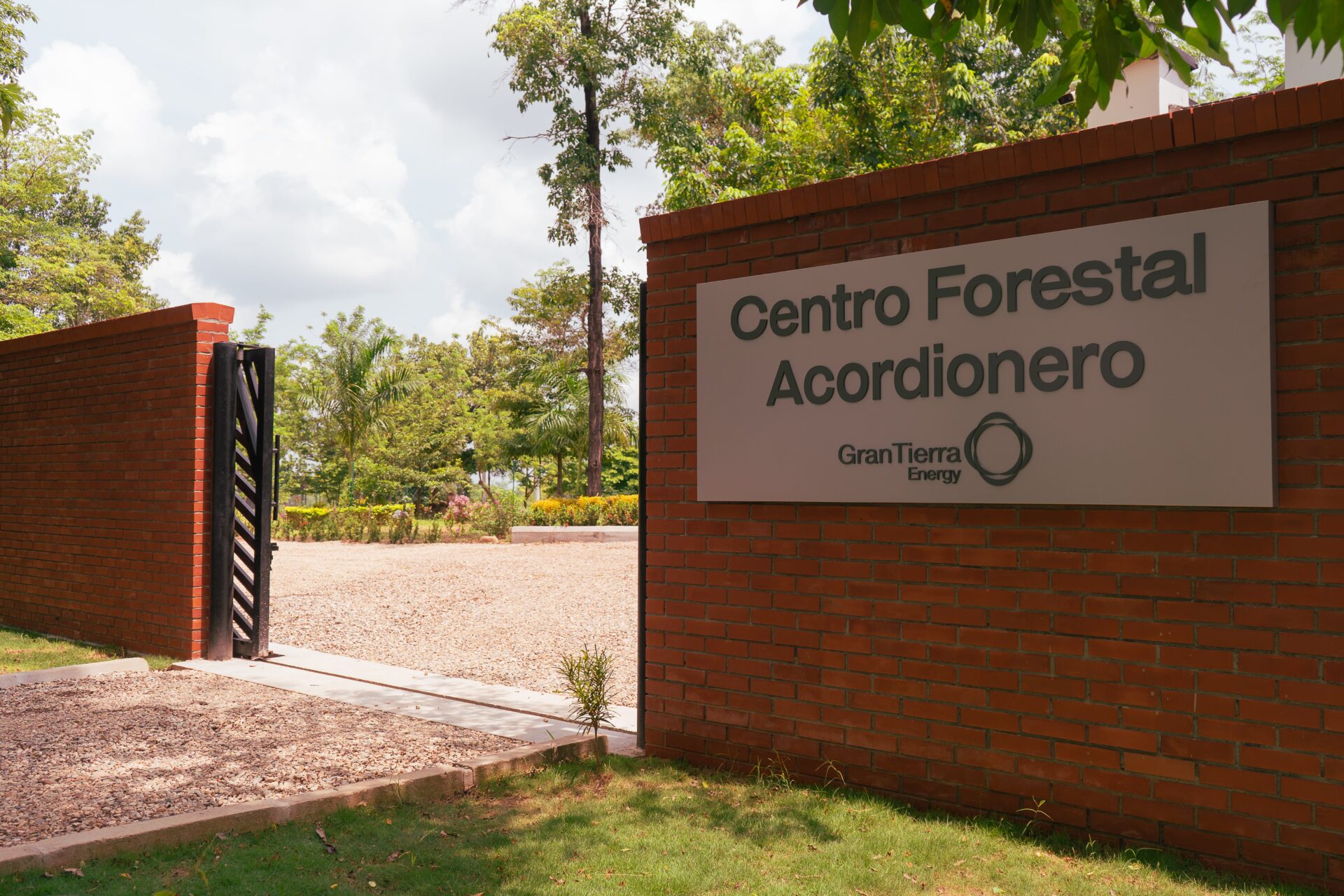22 July 2025
Gran Tierra Energy Officially Opens the Acordionero Forestry Centre in San Martín, Cesar
- Gran Tierra Energy (GTE) is proud to announce the opening of the Acordionero Forestry Centre (AFC)—a new facility dedicated to advancing biodiversity conservation, sustainable agricultural management, and environmental innovation.
- Within the Centre, GTE and local community members, are testing innovative aquaponics systems as part of a broader effort to explore sustainable agriculture models that could enhance environmental and economic resilience in the region. The aquaponics system accelerates food production, with a small land footprint, and have the goal of increasing food security and lowering food costs for families in the region.
- This initiative aligns with GTE’s Beyond Compliance philosophy and Colombia’s environmental goals, contributing to the recovery of strategic ecosystems, enhancing food security and preserving water sources in San Martín.
- The Acordionero Forestry Centre has already conserved 185 hectares and planted nearly 11,000 trees, playing a key role in protecting the region´s biodiversity.
San Martín, Cesar. July 22, 2025 – Gran Tierra Energy (GTE) has officially opened the Acordionero Forestry Centre (AFC), a 185-hectare environmental innovation hub located in El Cairo village, a strategically important conservation zone in Cesar. It is Gran Tierra’s hope that AFC will play a key role in restoring forest corridors and preserving water bodies thar provide water to the surrounding communities. Nearly 11,000 native trees have already been planted at the Centre, reinforcing the Centre’s contribution to ecosystem recovery in the region. The AFC has also been designed to test and implement sustainability efforts aimed at long-term environmental resilience and regional economic development.
At the heart of this innovation hub is a solar-powered aquaponics system that merges fish farming with hydroponic plant cultivation in a closed-loop system. Nutrient-rich water from tilapia tanks is used to irrigate and fertilize crops such as basil, cherry tomatoes, lettuce, and aromatic herbs—without the need for soil or chemical pesticides. The system recycles water continuously, achieving over 90% water savings compared to conventional agriculture, and is powered by solar energy to ensure operational efficiency and a low environmental impact.
Leodan Navarro Herrera, a community member from la Vereda el Cairo has been participating and blogging about his experience at the aquaponics facility in the Acordionero Forestry Centre. He said that, “the Acordionero Forestry Centre has allowed us to see how we can work our land in a more efficient and sustainable way. With hydroponic pilot projects we have seen first-hand how, with a small portion of land, we can grow different crops in less time and with a significant increase in the volume. I´m sure that this could change the way we live and we could spend less money on food and accelerate the production of our crops.”
In addition to the aquaponics systems, the AFC includes a forest nursery for the restoration of native species of plants and trees. Currently the nursery is producing approximately 9,000 plants per month, that are used to conserve surrounding forest and are being donated to local families.
The Acordionero Forestry Centre also includes a meliponiculture initiative that plays a key role in biodiversity conservation by protecting and reproducing native stingless bees—essential pollinators that support the health and regeneration of local ecosystems. These bees assist in the pollination of both native forests and cultivated plantations, helping sustain biodiversity and agricultural productivity. The initiative is also promoting environmental education by raising community awareness about the ecological importance of bees, while creating opportunities for local businesses in the production of high-value medicinal honey and honey-based products. By protecting bees, the AFC is helping to safeguard entire ecosystems and secure a more sustainable future for the region.
Within the AFC, GTE installed residential-scale anaerobic biodigesters. This system treat wastewater organically and produces biogas, eliminating open sewage while providing energy that can be used for cooking. In many rural Colombian villages, untreated wastewater flows through open sewers, creating serious health and environmental risks—especially during the rainy season. At the same time, limited access to propane forces many households to rely on firewood, contributing to deforestation, air pollution, and causing significant adverse health effects. This technology demonstrates how thoughtful design can create lasting environmental, social, and economic impact.
“At the Acordionero Forestry Centre, we are piloting scalable solutions that integrate environmental stewardship with new approaches for food security,” said Diego Perez-Claramunt, President & Country Manager, Colombia. “Through the Acordionero Forestry Centre, Gran Tierra Energy continues to support community-driven initiatives to strengthen Colombia’s ecosystems and support local families.”
As part of its long-term vision for responsible resource development, GTE integrates environmental stewardship into every aspect of its operations, ensuring its activities support both a thriving environment and resilient communities. The Company prioritizes nature-based solutions to protect ecosystems and natural resources, aligning with Colombia’s environmental objectives.
This Centre also highlights how Gran Tierra Energy goes beyond compliance by integrating its environmental legal requirements and new innovative conservation initiatives. Through the Acordionero Forestry Centre, Gran Tierra Energy continues to lead in environmental responsibility, by combining reforestation, water conservation, and community-driven initiatives to strengthen Colombia’s ecosystems and support local families.
